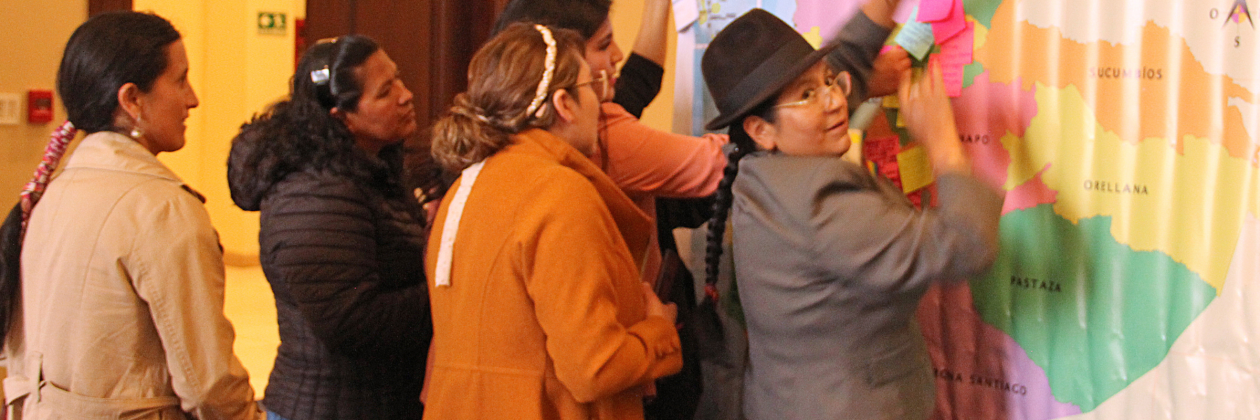
Stronger Together: Women and Men Unite for Gender Equality in Ecuador’s Political Parties
As Ercilia tried to ask the mayor at a plenary session about an illegal contracting process occurring in her town in northern Ecuador, her voice stopped resounding across the room. Someone had turned off her microphone, stopping her from asking a question.
Serving as vice-mayor and in various other political positions, this wasn’t the first or last time Ercilia faced gender-based discrimination and political violence. She had been locked out of meetings by male colleagues.
In Ecuador, women face more barriers than men in achieving and succeeding in political office and leadership roles.
For a woman named Virginia, a professional interior designer, it was easier to enter politics and earn respect among her colleagues. She had family as members of the social-democratic party, Izquierda Democrática (Democratic Left). However, she often struggled to persuade the party to expand opportunities for other women, such as access to professional and political development resources.
“It’s been a great opportunity but also a bit frustrating,” Virginia said. “Many women in the party are ready to work and develop themselves politically and personally, but there is a very serious lack of internal and institutional democracy and equality.”
Similarly, the experiences of Virginia, Ercilia, and countless other women across Ecuador run counter to the values and stories that initially romanticized Ecuadorian politics. Andoni, an international political scientist, one of 14 men who participated in the program, grew up hearing stories about his grandfather’s influence within the socialist party and reading political texts and literature with his uncle.
When he saw the plights of his grandmothers—one of whom struggled as a single mother—he finally understood the extent of the patriarchal political structure in Ecuador and began to have greater admiration for women fighting for independence and representation.
Each of these individuals’ paths led them to participate in a program funded by the United States Agency for International Development and implemented by the International Foundation for Electoral Systems (IFES) and Fundación Esquel Ecuador. The program aimed to promote the visibility, equal participation, and political leadership of diverse women and male allyship within political parties. It not only provided discussion sessions but also leadership trainings and tools for entering politics.
In 2020, Ecuador passed a gender parity law requiring that the percentage of women heading candidate lists increase progressively until parity is reached. In 2021 the requirement was 15 percent; in 2023, 30 percent; and in 2025, a projected 50 percent.
Despite this mandated political parity, women still face challenges entering political spaces and, especially, being respected in positions of power. Even though the February 2023 subnational elections showed that 46.9 percent of candidacies were held by women, IFES and local partners learned of several incidents of parties evading the quota. One practice showed a woman as a mayoral candidate, only for a male candidate to take her place after the quota was fulfilled. Other practices infringed on women’s autonomy as leaders.
During the program with Esquel, participants had a chance to speak with other women and men from different political parties about the culture of gender in politics and how to guarantee true gender equality in elections. Ercilia said that in her experience fighting for women’s rights and protections, men were often reluctant to do the work despite having more influence in political spaces.
“In Indigenous towns, women must follow the opinion of the men or their decision,” Ercilia said. “It is in these training spaces [with Fundación Esquel] that we learn that women should not be afraid of making mistakes and that we should be more proactive.”
Now, Ercilia has a clearer vision of how she will propose greater protections for women; through work with other political organizations, for example, she can present several successful proposals for policy changes. Next, she plans to tackle policy improvements around public transportation. She says it’s an issue that must be addressed since violence and sexual harassment occur so frequently on buses and trains.
“I feel fulfilled with a greater focus to analyze a broader context of reality for women,” she said, noting that since the program, she feels empowered to write an official proposal that asks the right questions and presents nuanced discourse.
Not coming from a background where she struggled to emerge into her party, Virginia said listening to and working with other women “changed her inner view” of herself and others and opened her eyes to the violence and harassment prevalent in Ecuadorian political parties.
The conversations facilitated by Esquel led Andoni to similar introspection. Because the program placed strong importance on engaging male allies, Andoni said it broadened his perspective on how even progressive men need a better understanding of how to support women who face conservative social views from older generations.
Noting the legalization of abortion in cases of rape in 2022 as an example of how men can use their influence to push women’s rights through the government, he said that after the training, he would be able to transmit more well-rounded views of women to the men in his party. Moreover, he will also be able to support his women colleagues in advocating for their rights in a space where they have traditionally struggled to be heard.
“In my case, as a political activist, perhaps someone who has had [access to] more decision-making spaces within the party, or to spaces with greater participation […], one can transmit the awareness so that others become aware of these realities,” Andoni said.
IFES’s program, “Building Technical Capacity and Public Confidence in Ecuador’s Electoral System,” was funded by the United States Agency for International Development from October 2020 until March 2023. The goal was, in partnership with Esquel, to promote the visibility, participation, and political leadership of diverse women in political organizations in Ecuador, as well as to provide technical and organizational support to the Consejo Nacional Electoral (National Electoral Council, CNE) and its electoral technology systems.



